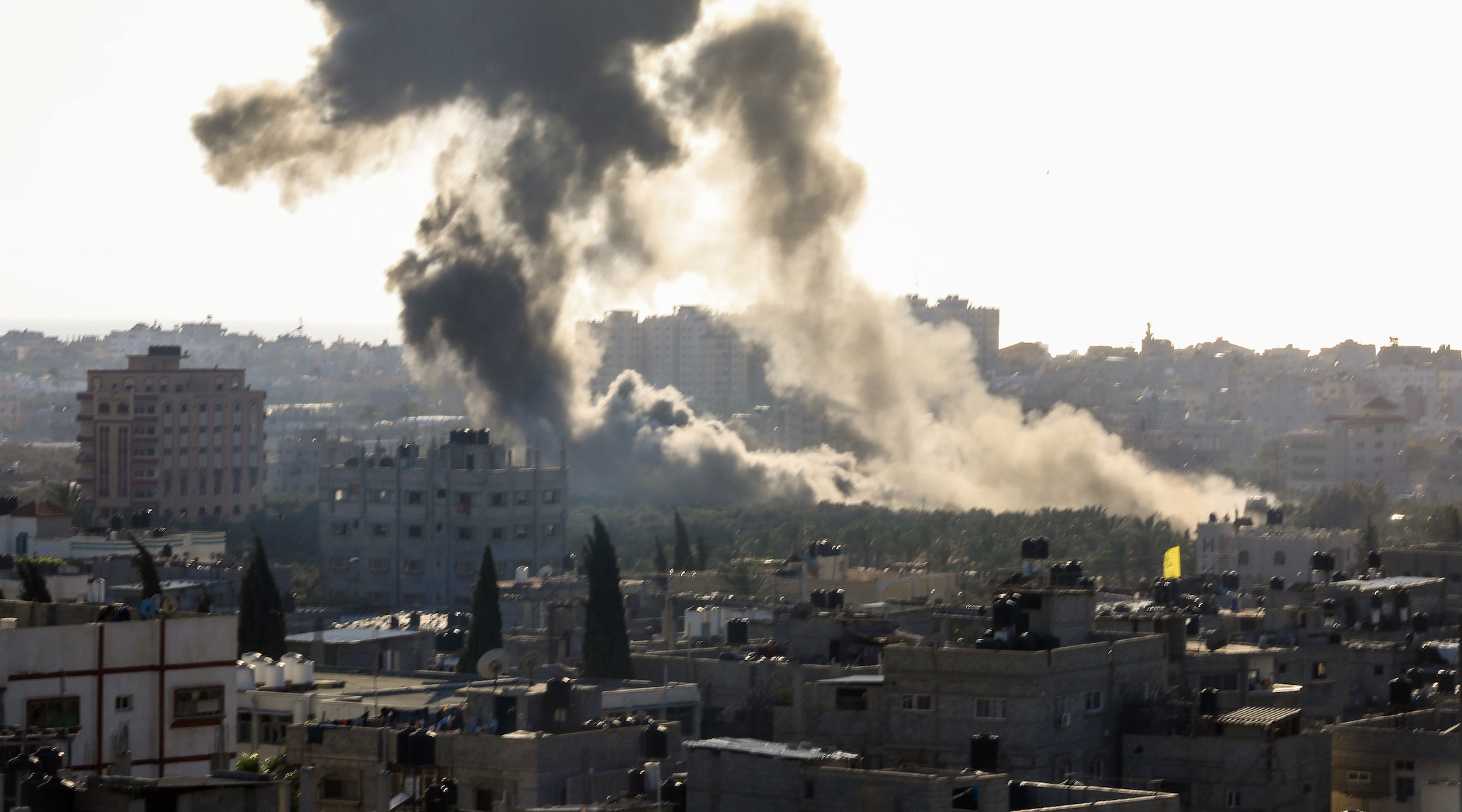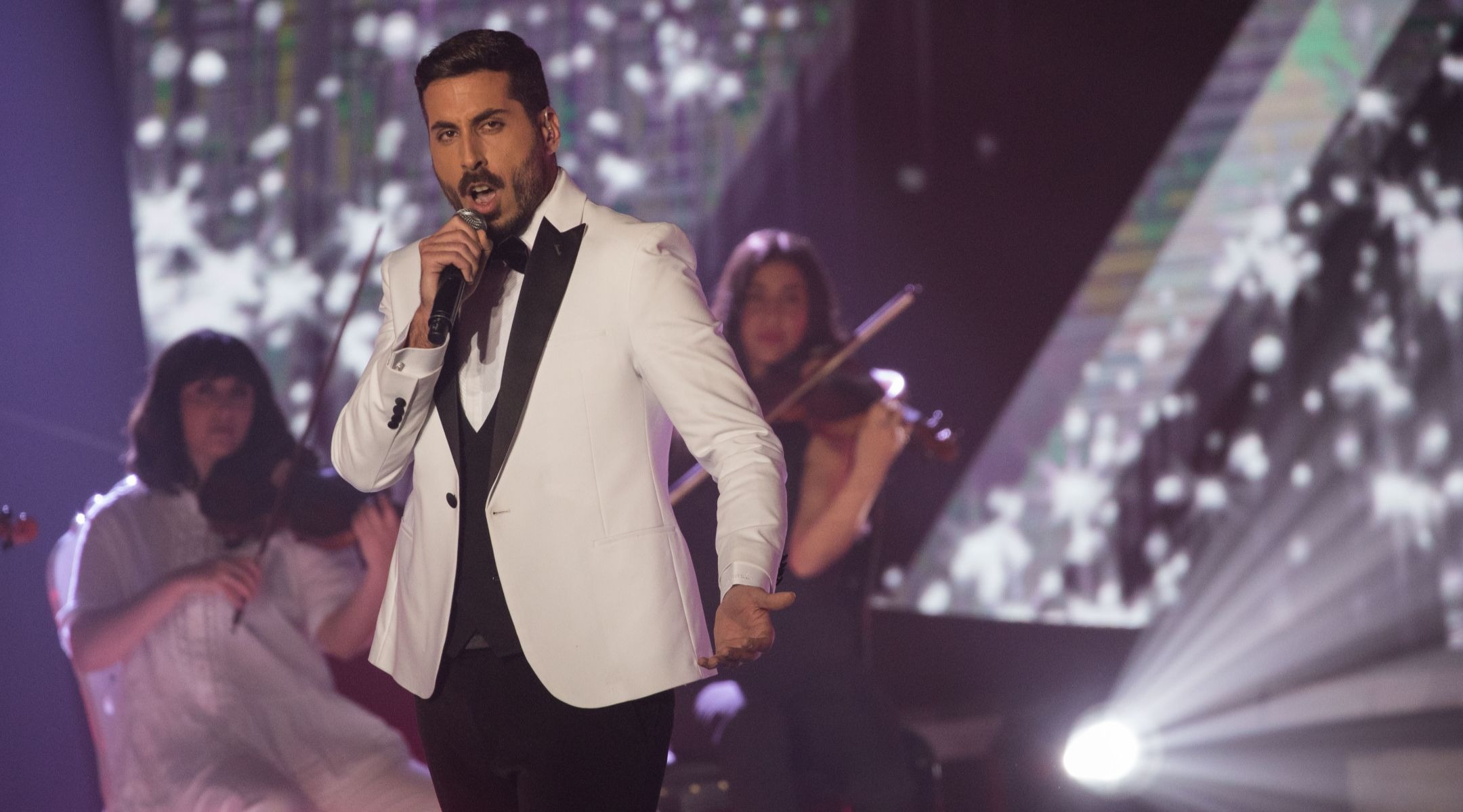Israel’s Eurovision planners say rockets won’t stop the music
Published May 6, 2019
TEL AVIV (JTA) — When Israel won the right to host this year’s Eurovision Song Contest, the event was anticipated as a golden opportunity to showcase a side of the nation rarely seen in global coverage of the “conflict.”
Then the rockets began to fall.
Over the weekend, Hamas and Palestinian Islamic Jihad fired hundreds of rockets into Israel, killing four people and wounding many more. A large part of the country spent the two days running for cover and taking shelter in safe rooms as the Israeli army and Hamas once more traded blows.
ADVERTISEMENT
The national mood was vastly different from only a few days before. Many Israelis were looking forward to the spectacle of Eurovision, an annual international competition that is being held next week in this city, and imagining how it would help shed their country’s image as a conflict zone and cement its place in European minds as a prosperous, fun destination.
Many people here believe the escalation was an attempt by Hamas to throw a monkey wrench into Israel’s Eurovision plans. Such thinking was reinforced by an anonymous Palestinian video circulated last month that threatened to disrupt the event unless Jerusalem agreed to lift its blockade of the Gaza Strip.
Eurovision, a five-day event starting May 14, will be held at the same time as Nakba Day, which the Palestinians mark in remembrance of their loss in the 1948 Arab-Israeli War.
At the height of the violence over the weekend, a number of senior Israeli officials declared publicly that concerns about Eurovision would not deter them from hitting Hamas hard.
ADVERTISEMENT
According to Haaretz, the Israel Defense Forces was instructed to “achieve the necessary operational goals” in Gaza prior to Independence Day and Eurovision. While Hamas and Islamic Jihad were said to be ready to reach a cease-fire on Sunday, the paper reported, the army believed it was important to show that it was willing to continue fighting despite the upcoming holiday — Yom Haatzmaut, Israel’s Independence Day, begins on Wednesday evening — and song contest.

Smoke rises following an Israeli airstrike in the Gaza Strip, May 4, 2019. (Hassan Jedi/Flash90)
By Monday morning, however, a cease-fire was in place and it appeared that the situation had largely returned to normal. It is unclear what effect the weekend’s hostilities will have on tourism for Eurovision, which even before their outbreak had started to look disappointing.
Israel won the right to host the song contest for the third time since 1979 by virtue of Israeli singer Netta Barzilai’s victory last year with the dance number “Toy.” Although Eurovision barely makes a ripple outside of Europe, the multi-night broadcast is wildly popular among the 42 countries that compete, drawing a television audience last year of 186 million.
“Our promise is that this will be the best Eurovision ever in the coolest city in the world,” Eytan Schwartz, the CEO of Tel Aviv Global, an initiative started by the municipality to promote tourism, told the Jewish Telegraphic Agency last week. “It looks like it’ll be a extravaganza and the most complex show ever.
“In terms of excitement, the level is only second to Mount Sinai,” joked Schwartz, noting that Israelis “have an obsession with our public image and how we are seen around the world.”
“Eurovision is a moment in which for one week, 1,500 reporters from around the world and 200 million viewers hear the exact message we always dream about. This is like the dream of anyone dealing with public diplomacy.”
Tel Aviv has invested in the event not only for the sake of public diplomacy, but also to boost tourism in the long term.
“We are at the highest moment ever for [our] tourism industry and now ready for [the] next leap, and that’s to show we can host large events,” Schwartz said. “That’s the legacy of Eurovision and how we measure its success. If this succeeds, we will become a city that can compete for large-scale events like in the U.S. and Europe.”
Calls for a boycott of the event by supporters of the Palestinians largely fizzled, with no country pulling out and only one act — a band representing Iceland — saying its entry would be an (implied) protest against the Israeli government.
However, there are some signs that the tourism panacea that the government is hoping for may not materialize. Ticket prices are high — some are going for $500 and more — and many remain unsold, according to the Israeli business outlet Globes. Moreover, far from the shortage of hotel rooms that some worried about, it appears that many hotels are not fully booked as expected and the influx of European music lovers may be smaller than hoped.
During the fighting, the incoming CEO of the Tour Operators Association, Yossi Fattal, told Haaretz that he did not believe the conflict would have a negative impact on tourism for the event.
“The question is if tourists [already in Israel] are asking to leave, and the answer is categorically no,” he was quoted as saying. “I assume that on [Monday] we’ll start to get questions from groups coming in the next few months, but anyone who is supposed to be coming in the next few weeks I don’t think will cancel.
“A few months ago they fired 500 rockets at us and then came the anti-tunnel operation, and there wasn’t a single cancellation. It’s logical that tourists would want to leave, but I haven’t heard of a single group that has given up and is going home,” Fattal said. “If once hundreds of rockets could bury Israeli tourism, that’s not the situation today.”
Even if the fighting does not have an outsize impact, however, the event will likely be less successful than hoped, with Haaretz citing a pre-conflict estimate of fewer than 10,000 foreign tourists coming for Eurovision, far from enough to max out local hotel capacity.
Whatever happens, locals are going all out to make the event memorable.
Schwartz described a massive effort by the local government to get the city into shape for the event, including the establishment of a Eurovision Village near the beach at Charles Clore Park and an adjacent area for the city’s annual Tel Aviv Eat food festival. The village will feature top-tier entertainment, he said, with free concerts and performances along with live broadcasts of the festival itself on giant outdoor screens.
There will be extra shuttle buses for Eurovision ticket holders on Shabbat, when public buses don’t run, and translators to help tourists find their way around.
Hundreds of new street signs will be going up, 800 volunteers will be available to guide European visitors and tens of thousands of free pocket guides are set to be distributed at 15 popup tourist information booths. In addition, Schwartz said the city has been running workshops to train those likely to come into contact with visitors on issues of cultural etiquette.
The municipality is not the only entity furiously making arrangements for Eurovision. The local branch of the international Eurovision fan club is also planning its own events and has rented out the mega-club Ha’oman 17 for what it is describing as a weeklong party.
“People are absolutely talking all day and all night” about it, said fan club representative Tal Dorot.
“It’s never been discussed as much in the mainstream media in Israel. Every channel has a segment on Eurovision every day for weeks. Five years people didn’t know when Eurovision was on,” Dorot said. “People in Tel Aviv are now planning either to leave because of the mess or how to get around. People who never imagined they’d be going to Eurovision parties are buying tickets. None of my colleagues at work were interested, and now they’re asking questions and are really interested.”
Israelis’ interest in the competition goes way beyond the dedicated core of fans, said Daniel Dunkelman, a Eurovision blogger who advises media outlets on their coverage of the contest.
“How into it is the average Israeli? It’s one of the most talked about topics in the last year in Israel, and especially now as we are getting closer to the event,” he said.
Singer Kobi Marimi, who will be representing Israel in Eurovision this year, told JTA that people often come up to him on the street and gush. Because Eurovision is being held in Israel, he said, “more than ever the Israeli audience has been interested in who will represent the country in the competition.”

Kobi Marimi performs in Jerusalem during the final of the reality show “The Next Star,” Feb. 12, 2019. Marimi will represent Israel in Eurovision. (Noam Revkin Fenton/Flash90)
“There is a lot of love and a lot of support. They remind me all the time they have my back no matter what the outcome. The excitement here is enormous, everyone counting the days and waiting for the celebrations to begin,” Marimi said.
“As with every event, there are difficulties and there are unplanned things that happen on the way. But the Israeli team was determined that it would be an unforgettable Eurovision and, as it seems, that’s what’s going to happen.”
Asked on Monday evening how the the mood in Tel Aviv has changed since a cease-fire went into effect, Dorot told JTA that Israelis’ resiliency would get them through.
“Well, there was a natural sense of sadness about the people who are the victims of this situation and worries about it affecting the competition,” he said. “But also optimism that it will work out.”
















